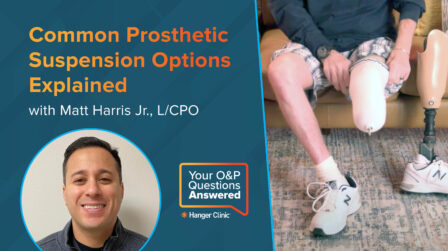Applying for Social Security Disability Benefits After Limb Loss

You may be eligible for Social Security Disability if an amputation has left you unable to work for more than a year.
Written by Maggie Baumer, Esq.
Social Security Disability (SSD) is an insurance program set up by the government, which provides coverage to workers who become disabled and have a verifiable work history in the United States. SSD benefits can provide financial support to those facing simultaneous limb and job loss.
Application Process
The application process is relatively simple, though somewhat time-consuming. You may apply online, by calling the toll-free number, 1 (800) 772-1213, between 7 a.m. and 7 p.m. Monday-Friday, or in person at your local Social Security Office (appointment recommended).
Your case will be assigned to an individual who can help you identify the materials you need to provide, as well as obtain required information from your healthcare providers. Once you submit your application, it can take up to 3 to 5 months to receive a decision. Thus, you should file your application as soon as you become disabled, or as shortly thereafter as possible. Since limb loss can take a significant period of time to recover from emotionally and physically, you may want to ask a friend, relative, or attorney to assist you with the disability application process. For more information about using a representative, please visit ssa.gov/representation.
The disability claims interview usually lasts about one hour.
Payments
To qualify for disability payments, you must be disabled for five full calendar months in a row. Once you are approved for SSD benefits, you will continue to receive payments as long as you meet the definition of “disabled.” The Social Security office will review your case periodically to see if your condition has improved significantly, which could result in the discontinuation of your benefits.
For example, if you start using a prosthesis that substantially improves your ability to walk or use fine and gross motor skills, which, in turn, enables you to return to work, you may no longer be eligible for benefits. However, if you start working while receiving benefits, you will become enrolled in a trial working period and can continue to receive benefits for up to 9 months. Your benefits are paid each month by direct deposit and are based on your average lifetime earnings. They generally range from $800 to $1,400 per month.
Once you have collected disability benefits for 24 months, you will become eligible for Medicare, and if your income is low, you may also qualify for Medicaid. However, if you have substantial income in addition to your benefits, you may have to pay taxes on them.
Eligibility
In order to obtain SSD benefits, you must:
- Demonstrate “disability.”
- Show a sufficient work history that has earned “credits” with Social Security.
To meet the definition of “disability,” you must show you cannot work due to a medical condition that is expected to last at least one year or to result in death. It may seem like losing a limb provides a guarantee of obtaining Social Security benefits based on this criteria; however, the definition of “disability” is interpreted very strictly by the government and several factors are considered, including:
- Whether you are continuing to work
- Whether your medical condition is severe—your limb loss must significantly limit your ability to do basic work activities (such as walking, sitting, and remembering) for at least one year in order to meet this criteria
- Whether your medical condition is on the List of Impairments
- Whether you can perform any other type of work
“Amputation” itself only meets the List of Impairments criteria if it is at certain levels or results in your inability to “ambulate,” or walk effectively, and/or your inability to perform fine and gross movements effectively.
Additionally, if you are unable to perform your previous job but can still perform substantial work, you may not be deemed “disabled.”
Recovering from limb loss is often a long process, but there are many resources available to assist you in getting back to a full life. The Social Security Disability program can provide direct financial support if you have experienced both limb and job loss. You can apply for these benefits online or by phone, and don’t be afraid to enlist the assistance of a friend, relative, or attorney.
If your application is denied, you have a right to appeal the decision. At the appeal stage, you may want to seek the advice of an attorney who specializes in Disability Law. You can find additional information and resources through the Amputee Coalition and the Social Security Administration.
Latest Updates
Subscribe to stay up-to-date on our latest posts.



